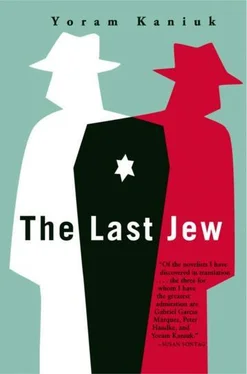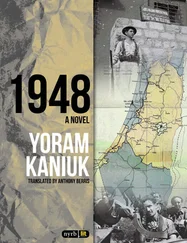I went outside, I looked at the brilliant sea, I found an old teacher looking at a wall he had painted with his own hands and he was ludicrous in his own eyes, superfluous vis-a-vis the silence of Noga and Hasha Masha, I said to myself, utter a song! Hasha Masha lived the moment and every moment was final, a tumult that begins and ends. Menahem is a foundation, not a display window…
My neighbor is smiling now, maybe he's also reading my mind, this moment is his! The water flows in the hose and I watch the stream of water, blended in it, flowing with it and then I'm finished on my neighbor's contours of pain and my pain is suddenly opaque, as if a miracle happened to it. But it doesn't let me flee from myself.
Go, he said, go, Mr. Henkin, it's important for all of us.
Who's all of us? I asked.
He didn't answer. His stream was sharper than mine. His water was more concentrated, and he enjoyed the sight of the water flowing from him, absorbed in the hollows, mixing with the organic mulch, annihilating the desolation the Giladis had left behind. There was an arrogant and malicious meekness in him, I thought, as if he were protecting himself, even from me, as if he were connected to the deed he was doing and to a possible escape from himself, he was routed and protesting at the same time.
All of us is a lot of people, he said, all of us is me, it's the woman who lives with and is married to me… here in the north, he said, the wind is humid, rusts, in the south the air is dry and purer.
In the south?
He didn't hear my question. He said: I'm not used to the north, the air makes me sick…. I was amazed at the use of the word "north" applied to Tel Aviv. I didn't understand what south he meant, and then, to add perplexity to my perplexity, he said: Near Marar the smells of orange blossoms were preserved in the clear thin air for a month after they finished blooming.
Since I didn't know what to ask, I said, You were in the south? From my words you could have thought I was talking about Sudan or Ethiopia. I thought about Marar, it was an Arab village I used to pass by years ago on my way south. The village was destroyed in the war my son fell in. I hadn't heard the name of the village since 'forty-eight. Boaz surely passed by Marar on his way to the settlement where he was born and where he returned to see his grandmother. The village was destroyed and not a trace remains of it except for a paratrooper memorial erected at the foot of it years later. I didn't have time to think when he said: Yes, the sand sticks to everything, the wind isn't harmonic, sometimes it is, sometimes it isn't, degree of dryness against degree of humidity, here is not the south, Mr. Henkin, and Boaz should have known that and protested, my neighbor's stream of water was now sparkling in the bright light of approaching dusk, and in the extracted sword blade flashed a bold rainbow full of colorful impulsiveness. Who are you meeting tonight, Mr. Henkin, he said more than asked.
A writer, I said and added with a thoroughly inappropriate apology: I was invited to a reception and haven't yet decided.
An Israeli?
No, I said, anger rising in me now: a Hebrew writer doesn't hold receptions. Too bad, said my neighbor with genuine grief that filled me with wrath because naivete, ignorance, and stupidity sometimes infuriate me more than simple belligerence. I don't know a lot, Mr. Henkin, said my neighbor, do you know what it means to be a person who has no life history? A man without a history? Not knowing anything but what you don't have to know. I ask, I don't mean to irritate. Now I really did pity him without knowing exactly why, I said, The problem is that I was invited to a meeting I don't want to go to. A meeting with a foreign writer, I added…
Foreign and hostile? he asked.
I laughed, a stream of water gleamed. He looked at me, even tried unsuccessfully to smile.
I said foreign, not hostile I hope, what does it mean that you have no life history?
I don't know, that's what they tell me, an important writer?
Yes, an important writer, I said.
I thought about the order of his words, the order of the questions, he was silent a moment, tried to read my mind and of course that incensed me, I shifted the hose to the bed of onions while he raised his eyes to the horizon now covered with reddish purple clouds and he asked, And where is that good and foreign writer from?
Germany, I said, swallowing the word, his roses stood erect after drinking so much and now looked terrifying in their pleasant and venomous beauty.
And he's a good man? he asked.
He took off his hat. He had gray hair, pulled back with sweat. Drops of water coursed on his cheeks.
I think so, I said, I read his books, in Hebrew translation, of course, he's decent, no doubt about that, I felt funny apologizing to him, stripping naked in front of him, while as for him I don't know a thing about him, but I went on, what does it mean, decent? He takes dogs across the street? Old women? I assume he's decent, that the self behind the words is decent and honest. I think, I said, that he succeeds in doing what great literature should do, which is to give birth to things that haven't yet been born, reveal what was invisible, give legitimacy to the absurd and surely our lives are nothing if not completely absurd. His face was closed, he was listening or not, I don't know. The roar of the water in the hoses was louder. The silence of the approaching evening enveloped us. I tried to understand what a man with no life history thinks, a man from whom nobody expects anything. I thought about the Shimonis' apartment, where the Committee of Bereaved Parents meets every single week. The thundering laughter internalized somehow whenever Jordana from the Ministry of Defense started chewing one of the plastic vegetables in a bowl there, as if by mistake. She's a Yemenite, Jordana, her teeth are white, once when she chewed the plastic vegetable she said to me: Too bad they put life into the china statue I was meant to be. When was the last time I saw a china doll in the form of a Yemenite woman? And I didn't laugh, and those sad parents laughed as if they'd fall out of their clothes and only Jordana and I didn't laugh. They needed to laugh together, loathe together, live together, and those plastic vegetables they don't remove from the table of the Shimonis whose son fell in the battle for the fortress of Navi Yehoshua in the Galilee, which turned their house into a club, never did you feel that you were disturbing there, that you were intruding on their privacy, and at their house the meeting would be held this evening…
Mr. Henkin, maybe you can do me a favor, said my neighbor, his eyes fixed on the sunset that now ran riot as usual, full of cheap splendor and glory, purple clouds slowly joining together in the sky, turning gray and a light kindled in them, like a last attempt at life, a small plane flew low, intending to land in the small airport beyond Reading, its lights going off and coming on and it made a big circle in the sky where a flock of birds sailed in a hypnotic, geometric silence.
Maybe you'd do me a favor, he said.
Of course, I said. Not a muscle moved in him now. Sculpted against the horizon. A flow of blood toward the thorny rosebushes, a sunset full of arrogance.
Tell the important and decent German writer that the scion of Secret Charity wants…
Who? I asked.
Tell him the scion of Secret Charity wants.
I laughed, since I'm expert at doing the wrong things at the wrong time. My neighbor didn't move and I thought he didn't sense my laughter, maybe he didn't hear it. And then he said, the muscles of your mouth, Mr. Henkin, don't know how to laugh. That has to be learned too. I tried to protest because his words were sharp, too sudden, but he waved his hand as if driving off some pest, another plane circled now and started landing, the water in my hose dwindled a moment, as if in spite, maybe Hasha Masha was taking a shower, maybe she flushed the toilet, and then from the silence and my stream of water that had almost stopped, he said: Tell him I want him to give me back my daughters.
Читать дальше












